Shopi
Shopi or Šopi (South Slavic: Шопи) is a regional term, used by a group of people in the Balkans, self-identifying as Bulgarians, Macedonians and Serbs. The areas traditionally inhabited by the Shopi or Šopi is called Shopluk or Šopluk (Шоплук), a mesoregion,[1] roughly where Bulgaria, Serbia and North Macedonia meet.[2] In 2011 census in Serbia they are registered as separate ethnicity[3] and 142 persons declared themselves as belonging to this ethnicity.[4]
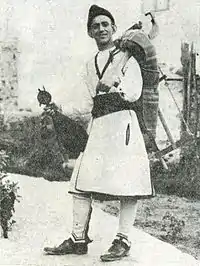
| Part of a series on |
| Bulgarians Българи |
|---|
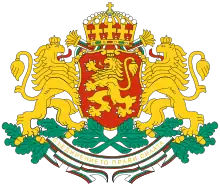 |
| Culture |
| By country |
| Subgroups |
| Religion |
| Language |
| Other |
|
| Part of a series of articles on |
| Serbs |
|---|
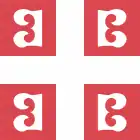 |
Name
According to Institute for Balkan Studies, the Shopluk was the mountainous area on the borders of Serbia, Bulgaria and North Macedonia, of which boundaries are quite vague, in Serbia the term Šop has always denoted highlanders.[5] Shopluk was used by Bulgarians to refer to the borderlands of Bulgaria, the inhabitants were called Shopi.[6] In Bulgaria, the Shopi designation is currently attributed to villagers around Sofia.[7]
Shopluk area
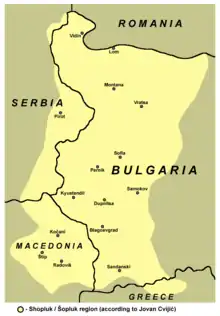
- Southeastern Serbia
- Western Bulgaria (White Shopluk [9])
- Sofia City Province (villages around Sofia, capital of Bulgaria)
- Sofia Province (part of the Small Shopluk)
- Vidin Province
- Vratsa Province
- Montana Province
- Pernik Province (part of the Small Shopluk)
- Kyustendil Province (part of the Small Shopluk)
- occasionally also Blagoevgrad Province as Black Shopluk[9]
- Northeastern North Macedonia
Classification
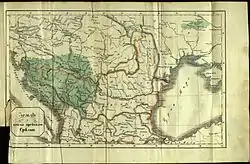
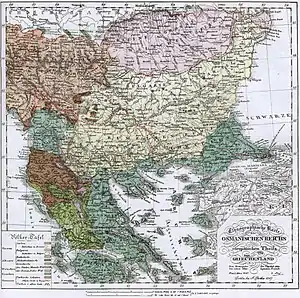
Most of the area traditionally inhabited by the Shopi is in Bulgaria. The majority of the Shopi (those in Bulgaria, as well the territories which were part of Bulgaria before 1919) identify themselves as Bulgarians, while those in the pre-1919 territory of Serbia - as Serbians and those in North Macedonia - as Macedonians.
The noting of Shopi as a "group" began in the 19th-century migrational waves of poor workers from the so-called Shopluk, poor areas (villages) beyond Sofia.[10]
The Bulgarian scholars put Shopi as a subgroup of the Bulgarian ethnos. As with every ethnographic group, the Bulgarian Academy notes, the Shopi in Bulgaria consider themselves the true and most pure of the Bulgarians, just as the mountaineers around Turnovo claim their land as true Bulgaria from time immemorial, etc.[11]
Many Yugoslav and Serbian scholars put the Šopi (also known as Šopovi[12]) as a subgroup of the Serbian ethnos, claiming that the group is closer to Serbs than Bulgarians culturally and linguistically, calling it a Serbian population in a foreign (Bulgarian) area, at the Serbo-Bulgarian border.[13] The nationalist[14][15] Serbian ethnographer Jovan Cvijić, presented in 1919 at the Peace Conference in Paris a study in which he had divided the Shopluk into three groups: Serbs, mixed population, and a group closer to Bulgarians. He also claimed that the Serbian tradition of Slava was celebrated in the region, this according to him being an important cultural marker.[16]
According to A. Belitch and T. Georgevitch (1919), the Shopi were a mixed Serbo-Bulgarian people in Western Bulgaria of Serbian origin.[17] This Serbian ethnographical group, according to them, inhabited a region east of the border as far as the line Bregovo-Kula-Belogradchik-Iskrets, thence towards Radomir and to the east of Kyustendil; to the east of that limit the Serbian population, blended with the Bulgarian element, reached the Iskar banks and the line which linked it to Ihtiman.[17]
The French Jérôme-Adolphe Blanqui, when traveling across Bulgaria in 1841, describes the population of the Sanjak of Niš as Bulgarians.[18] Felix Philipp Kanitz recalled that in 1872 (during Ottoman rule), the inhabitants had a Bulgarian national conscience. By the end of the 19th century (when the area was in Serbia), the residents of Pirot were divided on the issue, many in the older generation having a fondness for Bulgarians.[19] Also, in the 19th century the Shopi area was one of the centres of Bulgarian National Revival. It was ceded to the Bulgarian Exarchate.
According to the Czech Jireček the Shopi differed very much from the other Bulgarians in language and habits, and were regarded as a simple folk. He connected their name to the Thracian tribe of Sapsei.[20]
The American Association for South Slavic Studies noted that the Shopi were recognized as a distinct sub-group in Bulgaria.[21]
The rural inhabitants near Sofia were popularly claimed to be descendants of the Pechenegs.[22][23] The Oxford historian C. A. Macartney studied these Shopi during the 1920s and reported that they were despised by the other inhabitants of Bulgaria for their stupidity and bestiality, and dreaded for their savagery.[24]
Dialects
Shopi speak a group of related dialects that belong to the "et" (western) group of Bulgarian dialects. The dialects spoken by the Shopi are sometimes collectively referred to as Shopski (Шопски), although this is not the accepted term in Bulgarian dialectology.[25] Instead, the Western Bulgarian dialects are divided into South-Western, spoken mostly in Southwestern Bulgaria, except the region around Sofia and parts of the region along the Serbian border; North-Western, spoken mostly in Northwestern Bulgaria and around Sofia and the Transitional dialects (sometimes called Extreme North-western dialects), spoken along the border with Serbia around Tran, Breznik and Belogradchik as well as among Bulgarians around Bosilegrad and Dimitrovgrad in Serbia. The Torlak dialects spoken by Serbs are also classified by Bulgarian linguists as part of the Transitional Bulgarian dialect, although Serbian linguists deny this. The speech that tends to be closely associated with that term and to match the stereotypical idea of "Shopski" speech are the South-Western Bulgarian dialects which are spoken from Rila mountain and the villages around Sofia to Danube towns such as Vidin.
People from Eastern Bulgaria also refer to those who live in Sofia as Shopi, but as a result of migration from the whole of Bulgaria, Shopski is no longer a majority dialect in Sofia. Instead, most Sofia residents speak the standard literary Bulgarian language with some elements of Shopski, which remains a majority dialect in Sofia's villages and throughout western Bulgaria, for example the big towns and cities of: (Sofia and Pleven- transitional speech with literary Bulgarian language), Pernik, Kyustendil, Vratsa, Vidin, Montana, Dupnitsa, Samokov, Lom, Botevgrad.
The exposition below is based on Stoyko Stoykov's Bulgarian dialectology (2002, first ed. 1962),[25] although other examples are used. It describes linguistic features which differ from standard Bulgarian. The Standard Bulgarian words and sentences are given in romanization, with no attempt at scientific transcription apart from stress marking.
Phonology
- The variable known as /ja/ (променливо я), which corresponds to the Old Bulgarian yat vowel and is realised, in the standard language, as /ja/ or /ʲa/ (/a/ with palatalisation of the preceding consonant) in some positions and /e/ in others, is always pronounced /e/ in Shopski. Example: fresh milk in Shopski and Ekavian Serbian - presno mleko (пресно млеко) compared with standard Bulgarian - prjasno mljako (прясно мляко).
- The verbal endings for first person singular and third person plural have no palatalisation. Example: to sit in Shopski - seda, sedǎ (седа/седъ) but in standard Bulgarian, sedjǎ (седя)
- There is little or no reduction of unstressed vowels (as in Serbian).
- The personal pronoun for the first person singular is ja (я), as in Serbian, instead of az (аз), as in Bulgarian.[26]
- The personal pronouns for the third person are masc. on (он), fem. ona (она); neut. ono (оно), pl. oni (они), as in Serbian.[27]
- Palatalized /kʲ/ occurs in some cases where it is absent in the standard language. Examples: mother in Shopski is majkja (майкя) and in standard Bulgarian, majka (майка); Bankja (Банкя), the name of a town near Sofia, derived from Ban'-ka (Бань-ка), with a transfer of the palatal sound from /n/ to /k/.
Morphology
- The ending for first person plural is always -ме (-me), while in standard Bulgarian some verbs have the ending -м (-m). This feature however also appears in some Southern dialects.[28]
- The preposition (and prefix) u (у) is used instead of v (в). Example: "in town" is Shopski u grado (у градо) vs. standard Bulgarian v grada (в града), cf. Serbian u gradu.
Phonology
- In most (though not all) forms of Shopski, the stressed "ъ" (/ɤ/) sound of standard Bulgarian (which corresponds to Old Bulgarian big yus) or yer) is substituted with /a/ or /o/. Example: Shopski моя/мойо маж ме лаже (moja/mojo maž me laže), че одим навонка (če odim navonka) vs standard Bulgarian моят мъж ме лъже, ще ходя навън/ка) (mojǎt mǎž me lǎže, šte hodja navǎn/ka), (my husband is lying to me, I'll be going out).
Morphology
- Most often the definite article for masculine nouns is -o (-о) or -ot (-от), as in Macedonian dialects, instead of -a (-а) or -ǎt (-ът). Example: Shopski otivam u grado (отивам у градо) vs standard Bulgarian otivam v grada (отивам в града), "I am going in town"
- The -en/-jen (-ен/-йен) past passive participle ending is used much more extensively in the Shop dialect, as in Serbian, than in standard Bulgarian, which often has -t (-т) instead. Example: Shopski umijen (умийен, "washed"), ubijen (убийен, "killed"), otkrijen (открийен, "opened" or "discovered"), vs standard Bulgarian umit (умит), ubit (убит), otkrit (открит)
- In the past aorist tense and in the past active participle the stress falls always on the ending and not on the stem. Example: Shopski gle'dah (гле'дах), gle'dal (гле'дал) vs standard Bulgarian 'gledah ('гледах), 'gledal ('гледал), "[I] was watching; [he, she, it] watched"
Morphology
- In the present tense for the first and second conjugation, the ending for the first person singular is always -м (-m) as in Serbian while in standard Bulgarian some verbs have the ending -а/я (-a/ja). Example: Shopski я седим (ja sedim) vs standard Bulgarian аз седя (az sedja) (I am sitting, we are sitting)
- Most often the particle for the forming of the future tense is че (če) (Sofia dialect), ке (k'e) (Samokov dialect) or ше (še) (Elin Pelin dialect), instead of standard ще (šte). The form še is used in the more urbanized areas and is rather common in the colloquial speech of Sofia in general. Example: Shopski че одим, ше ода, ке ода/одим (ше) ода (če odim, še oda, k'е oda/odim) vs standard Bulgarian ще ходя (šte hodja) (I will be going)
- Lack of past imperfect active participle, used to form the renarrative mood. In other words, in these dialects there are forms like дал (dal), писал (pisal), мислил (mislil), пил (pil) (past aorist active participles), but no дадял (dadyal), пишел (pishel), мислел (mislel), пиел (piel).[29]
Other features
The /x/-sound is often omitted. Despite being particularly associated with Shopski, this is actually characteristic of most rural Bulgarian dialects. Example: Shopski леб (leb), одиа (odia) vs standard Bulgarian хляб (hljab), ходиха (hodiha) (bread, they went)
Vocabulary
There are plenty of typical words for the Shop dialect in particular, as well as for other western dialects in general. Some examples are:
| Shop dialect | standard Bulgarian | standard Serbian | standard Macedonian | English translation |
|---|---|---|---|---|
| сакам (sakam) | искам (iskam), желая (želaja) | хоћу (hoću), желим (želim); иштем (ištem), (archaic) | сакам (sakam) | (I) want |
| чиним, правим, работим (činim, pravim, rabotim) | чиня, правя, работя (činja, pravja, rabotja) | радим (radim), чиним (činim) - to do; правим (pravim) - to make | работам (rabotam) - to do, чинaм (činam) - to do, правам (pravam) - to make | (I) do/make |
| прашам, питуем (prašam, pituem) | питам (pitam) | питам (pitam); питуjем (pitujem), archaic | прашувам (prašuvam) | (I) ask |
| чувам, пазим (čuvam, pazim) | пазя (pazja) | чувам, пазим (čuvam, pazim) | чувам (čuvam), пазам (pazam) | (I) keep, bring up, raise (a child) |
| спийем, спим (spijem, spim) | спя (spja) | спавам, спим (spavam, spim (arhaic) ) | спиjaм (spijam) | (I) sleep |
| ядем, ручам (jadem, ručam) | ям (jam) | jедем, ручам (jedem, ručam) | jадам, ручам (jadam, ručam) | (I) eat |
| тражим, дирим (tražim, dirim) | търся, диря (tǎrsja, dirja) | тражим (tražim) | барам (baram) | (I) search |
| оти?, за какво?, за кво?, що? (oti?, za kakvo?, za kvo?, što?) | защо?, за какво? (zašto?, za kakvo?) що? (što?) (colloq.) | зашто?, што? (zašto?, što?) | зошто? (zošto?), оти? (oti?) | why? |
| окам, викам (okam, vikam) | викам (vikam), крещя (kreštja) | вичем, викам (vičem, vikam) | викам (vikam) | (I) shout |
| кошуля (košulja), rare — риза (riza) | риза (riza) | кошуља (košulja) | кошула, риза (košula, riza) | shirt |
| рипам (ripam) | скачам, рипам (skačam, ripam) | скачем, рипим (skačеm, ripim [archaic]) | скокам, рипам (skokam, ripam) | (I) jump |
| зборуем (zboruem), зборувам (zboruvam), приказвам (prikazvam), оратим (oratim), говора (govora), вревим (vrevim), думам (dumam) | говоря (govorja), приказвам (prikazvam), думам (dumam) (obsolete) | говорим (govorim), причам (pričam); зборим (zborim), (archaic) | зборувам (zboruvam), говорам (govoram), прикажувам (prikazhuvam), думам (dumam), вревам (vrevam) | (I) speak |
| мачка (mačka) | котка (kotka) | мачка (mačka) | мачка (mačka) | cat |
| пце (pсe), куче (kuče) | куче, пес (kuče, pes) | пас, псето, куче (pas, pseto (stylistically specific, only as an insult), kuče) | пес, куче (pes, kuče) | dog |
Culture
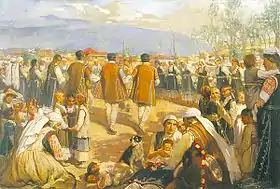
The Shopi have a very original and characteristic folklore. The traditional male costume of the Shopi is white, while the female costumes are diverse. White male costumes are spread at the western Shopluk. The hats they wear are also white and tall (called gugla). Traditionally Shopi costume from the Kyustendil region are in black and they are called Chernodreshkovci — Blackcoats. Some Shope women wear a special kind of sukman called a litak, which is black, generally is worn without an apron, and is heavily decorated around the neck and bottom of the skirt in gold, often with great quantities of gold-colored sequins. Embroidery is well developed as an art and is very conservative. Agriculture is the traditional main occupation, with cattle breeding coming second.
The traditional Shop house that has a fireplace in the centre has only survived in some more remote villages, being displaced by the Middle Bulgarian type. The villages in the plains are larger, while those in the higher areas are somewhat straggling and have traditionally been inhabited by single families (zadruga). The unusually large share of placenames ending in -ovci, -enci and -jane evidence for the preservation of the zadruga until even after the 19th century.
Artistic culture
In terms of music, the Shopi have a complex folklore with the heroic epic and humor playing an important part. The Shopi are also known for playing particularly fast and intense versions of Bulgarian dances. The gadulka; the kaval and the gaida are popular instruments; and two-part singing is common. Minor second intervals are common in Shop music and are not considered dissonant.
Two very popular and well-known fоlklore groups are Poduenski Babi and Bistrishki Babi — the Grandmothers of Poduene and Bistritsa villages.
Cuisine
A famous Bulgarian dish, popular throughout the Balkans and Central Europe[30][31][32] is the Shopska salad, named after the ethnographic group.
Social
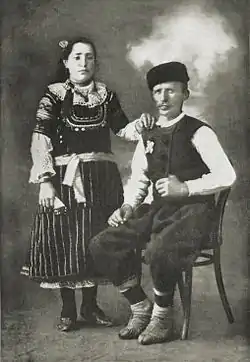
In the 19th century, around Vidin, it was not unusual for a woman in her mid 20s and 30s to have a man of 15–16 years.[6]
The Shopi in literature and anecdotes
The Shopi — especially those from near Sofia — have the widespread (and arguably unjustified) reputation of stubborn and selfish people. They were considered conservative and resistant to change. There are many proverbs and anecdotes about them, more than about all other regional groups in Bulgaria.
A distinguished writer from the region is Elin Pelin who actually wrote some comic short stories and poems in the dialect, and also portrayed life in the Shopluk in much of his literary work.
Anecdotes and proverbs
- "There is nothing deeper than the Iskar River, and nothing higher than the Vitosha Mountain." (От Искаро по-длибоко нема, от Витоша по-високо нема!).
- This saying pokes fun at a perceived facet of the Shop's character, namely that he's never traveled far from his home.
- Once a Shop went to the zoo and saw a giraffe. He watched it in amazement and finally said: "There is no such animal!" (Е, те такова животно нема!)
- So even seeing the truth with his own eyes, he refuses to acknowledge it.
- Once a Shop went to the city, saw aromatic soaps on a stand and, thinking that they were something to eat, bought a piece. He began to eat it but soon his mouth was filled with foam. He said: "Foam or not, it cost money, I shall eat it." (Пеняви се, не пеняви, пари съм давал, че го ядем.)
- When money is spent, even unpleasant things should be endured.
- How was the gorge of the Iskǎr River formed? As the story goes, in ancient times the Sofia Valley was a lake, surrounded with mountains. The ancient Shopi were fishermen. One day, while fishing with his boat one of them bent over in order to take his net out of the water. But the boat was floating towards the nearby rocks on the slope of the Balkan Mountains. Consequently, the Shop hit his head on the rocks and the entire mountain split into two. The lake flew out and the gorge was formed.
- There is a saying throughout Bulgaria that the Shopi's heads are wooden (дървена шопска глава, dǎrvena šopska glava), meaning they are too stubborn. In Romania there is such saying about Bulgarians in general.
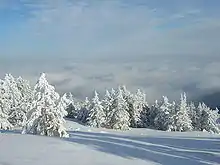
- Once upon a time three Shopi climbed on top of the Vitosha Mountain. There was a thick fog in the valley so they thought it was cotton. They jumped down and perished.
- This is to show three points: the Shopi are not very smart after all; Vitosha is very high; and, as a serious point, it is common to see Vitosha standing over low clouds shrouding the high plains and valleys of Western Bulgaria; this is a temperature inversion.
- Another example of the Shopi's stubbornness: Once, in the middle of summer, a Shop wore a very thick coat. When asked if it wasn't too hot, he answered: It's not because of the coat but because of the weather.
- The Shopi had a reputation of being good soldiers nevertheless there was a proverb: "A Shop will only fight if he can see the roof of his house from the battlefield", meaning he will only fight if he can see his personal interests in the fight. A proverb that wants to demonstrate the Shopi's selfishness, but may rather point to their conservatism, lack of interest to the outside world.
- Some Shop shepherds are said to have observed over 40 or 50 years from their meadows on the Vitosha mountain how the capital city - Sophia situated few kilometers downhill grew from 80 000 to 300 000 in the 1930s, how new buildings and parks sprang... but never took interest to go and see the city themselves.
- In other parts of Bulgaria all locals from Sofia are called, somewhat scornfully, "Shopi", although the majority of the city's population are not descendants of the real vernacular minority but of migrants from other regions.
- In addition, in other parts of Bulgaria there exists the use of the derisive form "Shopar" for Shop and "Shoparism" for untidy, outdated or primitive circumstances (which show some similarity to the employ of the term "Hillbilly" in the USA). Actually the word "shopar" in Bulgarian means "young boar" and has nothing to do with the Shopi. It is a term for untidiness, since the boar is a close relative to the pig.
- The sayings about the Shopi does not seize in modern day. There are popular sayings from communist period of Bulgaria such as:
- Even if the gasoline price grows to $100 I'll still drive my car. Even if the price drops to a penny, I am not buying it still.
- I will set my house on fire so the fire spread over my neighbor's barn.
- They pretend to pay me decent salary; I pretend that I am working (also very common in the former USSR).
- I take a look behind me – nothing; I take a look around me – nothing; and I am thinking – there is something. (It shows the paranoia of the Shop that the world is out to get him/her)
- A traveler came upon two Shopi sitting in the village square. Since he was traveling to Istanbul he asked one of them for directions in English. The Shopi made a clicking sound with his mouth and shook head, I don't understand. The traveler attempted the same question in French, German, Russian, Spanish and other languages, but had the same result. Aggravated, the traveler started going in one direction that happened to be wrong. The second Shopi, observing this scene, lamented to his buddy “Ah, this guy knows so many languages and you knew none of them.” The first Shopi said “And what good did it do him?”.
Honours
Shopski Cove in Antarctica is named after the Shop region.[33]
See also
- Torlakian dialect, a transitional dialect of Serbian, Bulgarian and Macedonian.
References
- Klaus Roth, Ulf Brunnbauer, Region, Regional Identity and Regionalism in Southeastern Europe, Volume 1 (2010), p. 19, LIT Verlag Münster
- Places to exchange cultural patterns, p. 4
- "2011 Census of Population, Households and Dwellings in the Republic of Serbia, ETHNICITY Data by municipalities and cities" (PDF). Statistical Office of the Republic of Serbia. 2012. p. 12.
- Ethnic communities with less than 2000 members and dually declared
- Balcanica, 2006 (37):111-124, The establishment of Serbian local government in the counties of Niš, Vranje, Toplica and Pirot subsequent to the Serbo-Turkish wars of 1876-1878,
- Franjo Rački, Josip Torbar, Književnik (1866), p. 13. Brzotiskom Dragutina Albrechta (in Croatian)
- Karen Ann Peters, Macedonian folk song in a Bulgarian urban context: songs and singing in Blagoevgrad, Southwest Bulgaria (2002), "shopluk" Google books link, Madison
- Bulletin of the Ethnographical Institute, Volume 41, 1992 p. 140
- according to Georgi Pulevski
- Places to exchange cultural patterns, p. 1
- Institut za balkanistika (Bŭlgarska akademii͡a͡ na naukite) (1993). Balkan studies, Volume 29. Édition de lA̕cadémie bulgare des sciences. p. 106.
Ethnography has long established that every ethnographic group, even every single village, considers its dialect, manners and customs "true" and "pure", while those of the neighbours, of the rest — even when they are "our people" — still are neither as "true", nor as "pure". In the Shopi villages you will hear that the Shopi are the true and most pure Bulgarians, while the inhabitants of the mountains around Turnovo will claim that theirs is the land of true Bulgarians from time immemorial, etc.
- Hrvatsko filološko društvo, Filologija, Volumes 1-3 (1957) p. 244, Jugoslavenska akademija znanosti i umjetnosti (in Serbo-Croatian)
- Srpski etnos i velikosrpstvo, pp. 261-262
- GREATER SERBIA - from Ideology to Aggression; Jovan Cvijic:Selected statements
- Cartography in Central and Eastern Europe: Selected Papers of the 1st ICA Symposium on Cartography for Central and Eastern Europe; Georg Gartner, Felix Ortag; 2010; p.338
- Prof. Marin Drinov, Ethnologia Balkanica (2002), p. 75, Sofia, LIT Verlag Münster.
- Crawfurd Price (1919). Eastern Europe ...: a monthly survey of the affairs of central, eastern and south-eastern Europe, Volume 2. Rolls House Pub. Co.
By A. Belitch and T. Georgevitch To the east of the Serbo-Bulgarian frontier, in Western Bulgaria, extends a zone still peopled to-day by a population of Serb origin, presenting a mixed Serbo-Bulgar type, and known under the name of " Chopi " (Shopi). The Serbian ethnographical element left in Bulgaria by the political frontier established at the Congress of Berlin in 1878, maintains itself in its fundamental characteristics, as far as the line joining up Bregovo, Koula, Belogratchik, and Iskretz, and proceeding thence towards Radomir and to the east of Kustendil; to the east of that limit the Serb population, blended with the Bulgar element, reaches the banks of the Isker and the line which links it to Ihtiman.
- Jérôme-Adolphe Blanqui, „Voyage en Bulgarie pendant l'année 1841“ (Жером-Адолф Бланки. Пътуване из България през 1841 година. Прев. от френски Ел. Райчева, предг. Ив. Илчев. София: Колибри, 2005, 219 с. ISBN 978-954-529-367-2.) The author describes the population of Sanjak of Niš as ethnic Bulgarians.
- Felix Philipp Kanitz, (Das Konigreich Serbien und das Serbenvolk von der Romerzeit bis dur Gegenwart, 1904, in two volumes) # "In this time (1872) they (the inhabitants of Pirot) did not presume that six years later the often damn Turkish rule in their town will be finished, and at least they did not presume that they will be include in Serbia, because they always feel that they are Bulgarians. ("Србија, земља и становништво од римског доба до краја XIX века", Друга књига, Београд 1986, p. 215)...And today (in the end of 19th century) among the older generation there are many fondness to Bulgarians, that it led him to collision with Serbian government. Some hesitation can be noticed among the youngs..." ("Србија, земља и становништво од римског доба до краја XIX века", Друга књига, Београд 1986, c. 218; Serbia - its land and inhabitants, Belgrade 1986, p. 218)
- The Encyclopædia Britannica: A-ZYM (20 ed.). Werner. 1903. p. 149.
The Upper Mccsian dialect is also called the Shopsko narechie or dialect of the Shopi. Jirecck says that these Shopi differ very much in language, dress, and habits from the other Bulgarians, who regard them as simple folk. Their name he connects with the old Thracian tribe of the Sapsei.
- American Association for South Slavic Studies, American Association for Southeast European Studies, South East European Studies Association (1993). Balkanistica, Volume 8. Slavica Publishers. p. 201.
The loci of this commentary are two well-studied Bulgarian villages, Dragalevtsy and Bistritsa, on the western flank of Mount Vitosha.3 Geographically they are a mere eight kilometers apart. Ethnically their base populations are similar, identified by other Bulgarians as Shopi. Shopi are a recognized and distinct sub-group within the relative homogeneity of Bulgaria at large. Being Shop continues to imply conservatism, despite proximity to Sofia. Our concern is with the ethnography of communication in these two village communities. Both experience considerable influences of urbanization, from students and ...
CS1 maint: multiple names: authors list (link) - Robert Lee Wolff (1974). The Balkans in our time. Harvard University Press. p. 40.
The inhabitants of one group of villages near Sofia, the so-called Shopi, were popularly supposed to be descendants of the Pechenegs.
- Edmund O. Stillman (1967). The Balkans. Time Inc. p. 13.
internally by distinctions of dialect and religion, so that the Orthodox Shopi, peasants dwelling in the hills surrounding Bulgaria's capital of Sofia, are alleged to be descendants of the Pecheneg Turks who invaded the Balkans in the 10th ...
- David Marshall Lang, The Bulgarians: from pagan times to the Ottoman conquest, Westview Press (1976), p. 41. ISBN 0891585303
- Стойков, С. (2002) Българска диалектология, 4-то издание. стр. 143, 186. Also available online
- http://www.promacedonia.org/jchorb/st/st_2_b_izt_3.htm#iztochni_rupski
- http://ibl.bas.bg/lib/bda4/#page/88/mode/1up
- http://www.promacedonia.org/jchorb/st/st_2_b4.htm#4.
- http://ibl.bas.bg/lib/bda4/#page/156/mode/1up
- Culinary Cultures of Europe: Identity Diversity And Dialogue, Stephen Mennell, Darra J. Goldstein, Kathrin Merkle, Fabio Parasecoli, Council of Europe, 2005, ISBN 9287157448, p. 101.
- Food Cultures of the World Encyclopedia, Ken Albala, ABC-CLIO, 2011, ISBN 0313376263, p. 67.
- Mangia Bene! New American Family Cookbooks, Kate DeVivo, Capital Books, 2002, ISBN 1892123851, p. 170.
- Shopski Cove. SCAR Composite Antarctic Gazetteer.
Sources
- Ethnologia Balkanica (2005), Vol. 9; Places to exchange cultural patterns by Petko Hristov, pp. 81-90, Journal for Southeast European Anthropology, Sofia
- Stanko Žuljić, Srpski etnos i velikosrpstvo (1997), Google Books link
External links
| Wikimedia Commons has media related to Shopi. |
